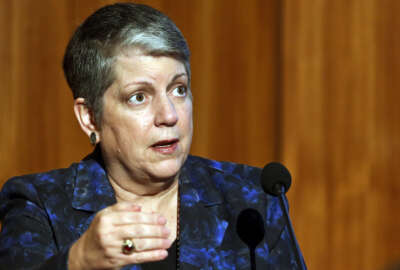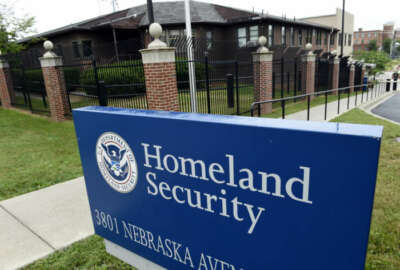
Napolitano offers advice on ‘little-understood role’ to future DHS secretaries
Janet Napolitano, former DHS secretary, discussed both daily and incidental challenges faced by the leader of the department.
In the wake of Kirstjen Nielsen’s nomination to be secretary of the Homeland Security Department, Janet Napolitano, who formerly held the position, shared some advice for anyone newly stepping into the role.
“I would say to any incoming secretary … just be ready to be flexible, know that you’ll have to multitask, know that you’ll need to be able to communicate effectively with the employees of the department and with the public at large. It’s a very important, albeit little-understood role,” Napolitano said on DHS 15th anniversary.
Napolitano said what makes the job so difficult is the sheer volume and variety of work. DHS has 15 different components scattered to the fringes of the country and beyond, all performing different tasks with varying degrees of overlap.
“I knew every day when I woke up and went into the office that I would likely not end up having spent the day on things I was planning to spend the day on,” Napolitano told the Federal Drive with Tom Temin. “Something would have happened overnight, or some new crisis was developing that would require my attention. The job of secretary requires one to be flexible and to be able to multitask.”
On top of bringing together all those various components and attempting to unify a dispersed workforce, Napolitano said the secretary also has to continuously act as a bridge between the department, the rest of the government, and the public at large.
She said one of her worst experiences as secretary was cleaning up after statements she made to the press “that were taken out of context but nonetheless were unartful” in the wake of the attempted “underwear bombing” in 2009.
“I think the role of the secretary is to lead, it’s to ensure that the department is doing what it needs to be doing, it’s to run political interference — for example, in response to natural disasters, I would often go tour the affected area, but I would take with me the elected representatives, senators from that area. I would interact with the governors. That was a relationship that I knew a lot about,” Napolitano said.
One of the things that frustrated her most about performing that role is the number of congressional committees and subcommittees that still retain jurisdiction over some part of DHS’ mission. She estimates that number at around 105, and said she testified before Congress roughly 55 times during her run as secretary.
And each time she testified, she said it was a drain on resources; each required people and time to gather information and prepare for the testimony. And the amount of wasted resources could be multiplied by the number of agency leaders that frequently testified alongside her.
“The amount of congressional oversight over the department is extreme, and I might add, not always helpful,” she said.
But that’s just another symptom of the urgent manner in which the department was assembled from disparate components 15 years ago.
“I think it is a young department that is still in the process of development, still in the process of knitting itself together and we are part of a chain of development, as it were,” Napolitano said.
Developing a mission statement and a set of overarching priorities that all of the components fit into was the beginning in trying to bring the department together.
“We tried to identify five or six core missions of the department, many of which crossed components. By identifying those missions, we fostered the need for different components to work with each other. So there were a variety of things we did to bring unity to the department, and a sense of departmental identity,” she said.
But it took time to develop that identity; Napolitano said every component brought its own culture to DHS. Slowly, as attrition took its toll, more workers were hired who had never served under any other banner than DHS, and a unique culture began to develop.
“I overall was very pleased with the quality of the workforce we had at the department,” she said. “They were dedicated to mission, they were hardworking, and they were good career civil servants.”
Subscribe to Federal Drive’s daily audio interviews on iTunes or PodcastOne
Copyright © 2025 Federal News Network. All rights reserved. This website is not intended for users located within the European Economic Area.



